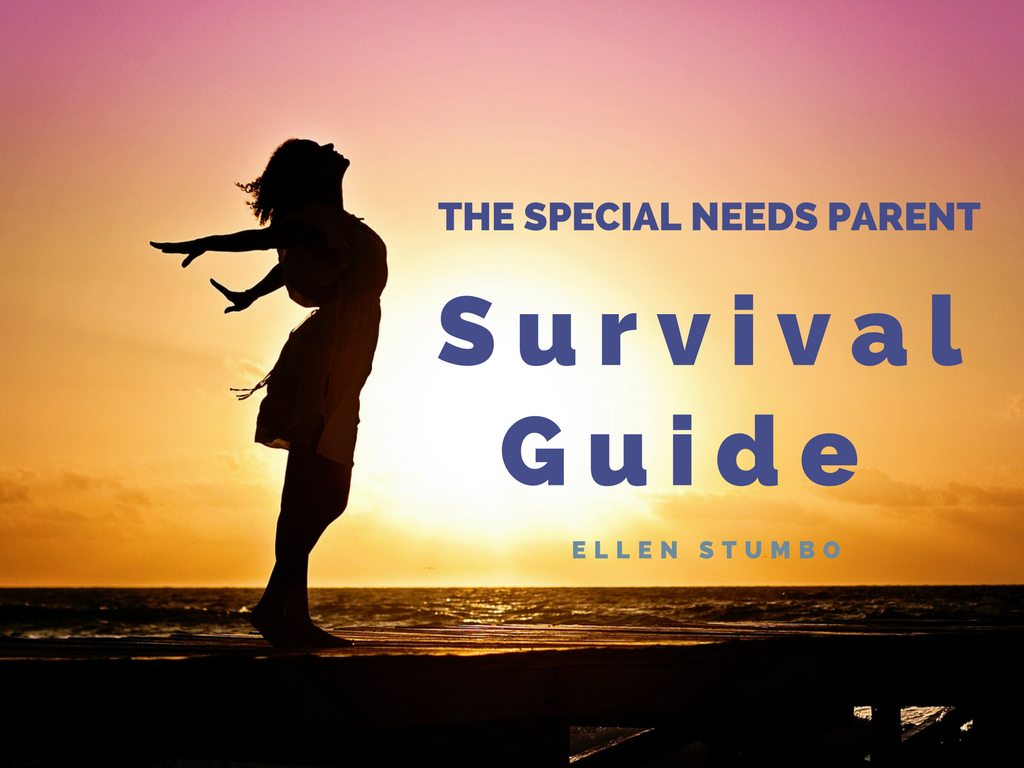As parents of kids with disabilities, we want our children to be treated with dignity and respect. But what if we, as parents, don’t model that? I’m going to say something that will make a lot of people uncomfortable: sometimes we are the ones who treat our children in undignified ways. When I first realized I was guilty of this, it broke me.

Looking back at my own blog entries from years past, I can’t help but notice the language I used and the over-sharing of personal details about my children. It turns out that even as a parent, I need to look at my own disability attitudes. If I don’t give my children dignity and respect, how can I expect others to do that too? If I am to be a role model, what am I communicating about my children? I need to be ever mindful of how my unconscious biases and attitudes impact my children and their community.
In the last few years I’ve been learning about disability attitudes. Because I’m a parent of kids with disabilities, and because I’m aware of other people’s negative attitudes towards disability, I somehow thought I had no problems with my personal disability attitudes. Things changed for me when I got to know adults with disabilities and I began listening to what they had to say. I was not an expert on disability because of my kids, they were the experts because they were the ones who were disabled. A lesson that, quite honestly, was humbling for me.
I’ve confused my girls’ story with my story. I’ve felt entitled to share information about them because of how it made me feel. I’ve disclosed some details that, if shared about me, would make me embarrassed and hurt. I did it all in the name of reaching other special needs parents and offering hope and encouragement. It turns out that I can do just that without compromising my children’s dignity and respect as human beings.
I parent a child with an intellectual disability, and it is easy for me to fall into the harmful and misinformed mindset that, “She doesn’t understand.” I must always assume that she does understand, even if she’s not able to demonstrate it. Because I am operating under this assumption, my words and actions must guard her dignity accordingly. I do understand. And because I do, I have a responsibility to be the one who upholds her basic human dignity before others.
What will I communicate to someone who does not live my life? What mental picture am I planting in their minds when they interact with my child or someone with a similar disability?
My child gains nothing from my over-sharing, instead, she loses. She loses someone looking at her as an equal, she loses her dignity, she loses respect in a world that already struggles to see her as valuable and human.
I understand that if I were to publicly share about bathroom struggles, period issues, meltdowns or bad moments, I would be stripping my daughter of the dignity and respect she deserves. Those things are not for me to share. If they would be humiliating for me or for a typical peer, then because I value her and think of her as someone who deserves dignity and respect, those things need to stay private. If I have a question about those issues, if I need support from other parents, there are private forums or groups to do so.
I didn’t always understand this.
I still get confused and share their stories as if they were mine because of how I feel. But, it is not about me, or other parents, it is about my children. Do I share with their dignity and respect in mind?
I still make mistakes and share more than I need to. I probably still will, but I am learning.
If I want my kids to be treated with dignity and respect, I have to start by being an example. An example in the way I write, in the way I speak, in the way I advocate.
I want my writing to reflect how precious my children are, how much I love them, how much they enrich my life.
I want the hope and encouragement to come from a place of dignity and respect for my kids while I acknowledge our struggles as parents. It is possible, and I believe that type of sharing is more powerful than giving personal details about meltdowns or a list of diagnoses.
I want, above all, to know that when my kids read my words or hear me speak, they’ll know they are safe, because I respect them and treasure their feelings and their dignity.
Always presume competence. As parents, we would do well to take that to heart.
Special Needs Parents, Are You Surviving?
I created a guide with 13 practical ways to help you find peace in the midst of chaos, opt in to make sure you get a copy of this freebie!



Ellen:
So grateful for this post. We actually have a document at Elim that we use for writing articles, called “How to Talk about People with Disabilities.” It’s a guide for language but also just how to think through what we say and what we share.
Your article reminds me not only of the ongoing struggle we have at Elim when it comes to that, but it also reminds me of the concept of “my story.” I spoke with a nonprofit executive who had told her development staff to stop sharing the stories of the people they served. Why? Because the story did not belong to the nonprofit, it belonged to the individual.
I disagreed.
My story (as someone with a speech disability) can be one of triumph, of success, of overcoming. But someone else’s story about me might be one of brokenness, shortcomings, and disability. Neither story is complete because each of us is trying to claim it. In the end, it is not my story, and it is not someone else’s story that is true.
It is God’s story.
So when we have a story to share at Elim, we try to remember that it is God’s story. That is true for all people, including people with disabilities. So, if my story of success and brokenness can be told in a way that humiliates me but glorifies God, then I think I need to be a-ok with that. And when I tell someone else’s story, I can remember to dignify them as an image-bearer, make sure they are okay with how they are talked about, and simultaneously submit their dignity before the throne of God.
Because it is His story.
I have been a wheelchair user for many years. I am shocked that people still believe in the fantasy that a disability is a blank check. It costs me a lot to be put on display for the curious.
Thank you. As a disabled woman who has written a lot about the issue of parents oversharing , and copped a lot of backlash for doing so, I really thank you for this. I have never said not to write about kids with disability, I have always said have a think about the way you represent them online. Would you like a photo of your naked body or description of painful moments on the Internet? Probably not. I hope other parent bloggers take note of your words. Thank you for not silencing us actually disabled, for listening to us and for wanting to show your daughter dignity, privacy and respect. I have linked to my post about this via my website section of the comment. I so appreciate this post Ellen.
Carly…you just made my day, I have a comment from THE Carly Findlay! I have followed you for a while and value what you have to say so much.
Thank you, because your posts have helped me understand. What you are writing for us parents – some of us are listening. I have several posts in this blog that will be edited (thanks to Tonia from Tonia Says). And I am so thankful for your voice as a disability advocate. I love that I can show my kids people in their own community to look up to.
If we, as the parents, do not listen to the adults who are disabled, we are only hurting our kids.
I am learning this very lesson myself. Thank you for sharing so candidly. I agree and have stopped sharing so openly about my twin girls’ personal lives. I do talk privately with other moms. I share funny or sweet moments and videos that I think will encourage someone else. I have 2 other teenagers so I try to only post things about any of my children that I think my 2 older teens would be okay with.
I am happy you are listening. I have written several times about that. Here’s one:
http://ollibean.com/privacy-and-parental-behavior/
Amy, thanks so much for sharing that link, it is so good. I read it, and then I read another post, and then another, then another! Your blog is so good and I hope many parents here click on over and learn from you. Wow, your words, so powerful.
This is one of the best posts I’ve seen regarding this issue. I’m a parent of a young adult with developmental disability. Our ultimate goal is that our kids have a great life of dignity and contribution. How can they make their own contributions if we are always stepping in to make contributions for/with them? How can they have their own voices if we don’t quiet our voices enough for theirs to be heard? Thanks for sharing so candidly and getting right to the point of the issue. It’s important. And other parents need to learn quicker than, perhaps, we did.
Thank you. My daughter also has an intellectual disability and I have been guilty of over sharing and not being mindful of her privacy. And you have hit the nail on the head as to the reasons why I have been so careless. My life and my daughter’s life sometimes seems to have little separation, I also feel her stories are mine. Because of the care she needs from me I am part of every aspect of her life. But, you are so correct, I need to remember she also owns a right to privacy and dignity in this world.
This article is fantastic! I’m a 32-year-old Autistic woman and I get so angry seeing all these oversharing parenting blogs and articles because they inevitably don’t have the permission of the disabled child/person (it’s usually children but sometimes adults) and the intimate details are *not* what I’d want the world knowing if it was me they were writing about. I want to ask them, “Would you like it if someone was sharing such details about you without your permission?” So much of it strikes me as a “Please pity me and feel sorry for me, I have it SO HARD, boo hoo”, etc and these posts are so often about the parent rather than the child.
I’m really glad you’re listening to us and have realised that oversharing is harmful. I hope other parents follow your lead and start treating their disabled relatives with the dignity and respect you are. 🙂